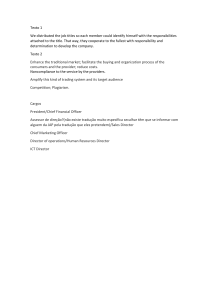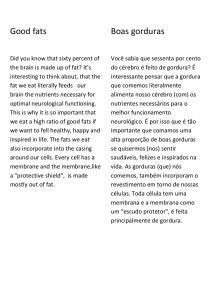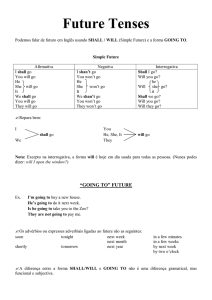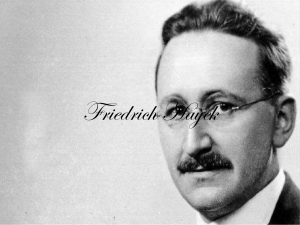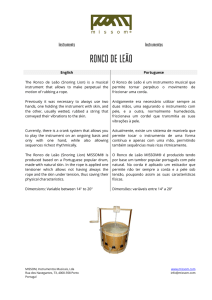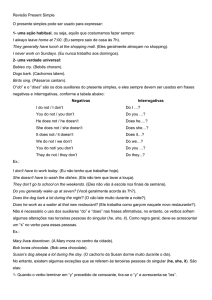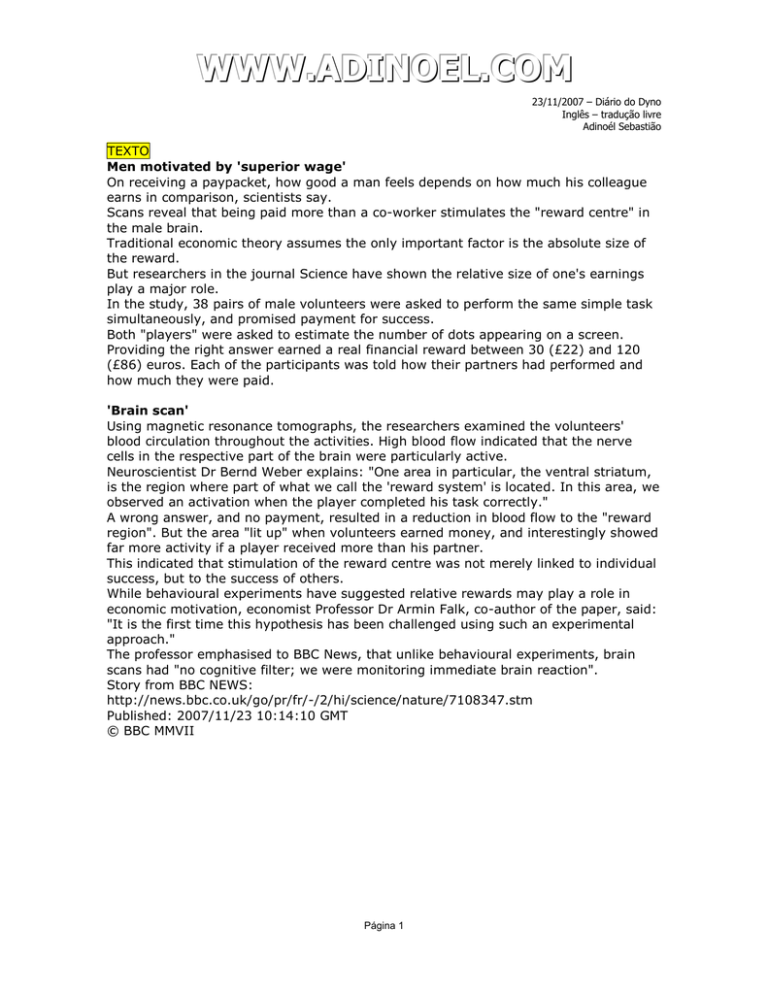
WWW.ADINOEL.COM
23/11/2007 – Diário do Dyno
Inglês – tradução livre
Adinoél Sebastião
TEXTO
Men motivated by 'superior wage'
On receiving a paypacket, how good a man feels depends on how much his colleague
earns in comparison, scientists say.
Scans reveal that being paid more than a co-worker stimulates the "reward centre" in
the male brain.
Traditional economic theory assumes the only important factor is the absolute size of
the reward.
But researchers in the journal Science have shown the relative size of one's earnings
play a major role.
In the study, 38 pairs of male volunteers were asked to perform the same simple task
simultaneously, and promised payment for success.
Both "players" were asked to estimate the number of dots appearing on a screen.
Providing the right answer earned a real financial reward between 30 (£22) and 120
(£86) euros. Each of the participants was told how their partners had performed and
how much they were paid.
'Brain scan'
Using magnetic resonance tomographs, the researchers examined the volunteers'
blood circulation throughout the activities. High blood flow indicated that the nerve
cells in the respective part of the brain were particularly active.
Neuroscientist Dr Bernd Weber explains: "One area in particular, the ventral striatum,
is the region where part of what we call the 'reward system' is located. In this area, we
observed an activation when the player completed his task correctly."
A wrong answer, and no payment, resulted in a reduction in blood flow to the "reward
region". But the area "lit up" when volunteers earned money, and interestingly showed
far more activity if a player received more than his partner.
This indicated that stimulation of the reward centre was not merely linked to individual
success, but to the success of others.
While behavioural experiments have suggested relative rewards may play a role in
economic motivation, economist Professor Dr Armin Falk, co-author of the paper, said:
"It is the first time this hypothesis has been challenged using such an experimental
approach."
The professor emphasised to BBC News, that unlike behavioural experiments, brain
scans had "no cognitive filter; we were monitoring immediate brain reaction".
Story from BBC NEWS:
http://news.bbc.co.uk/go/pr/fr/-/2/hi/science/nature/7108347.stm
Published: 2007/11/23 10:14:10 GMT
© BBC MMVII
Página 1
WWW.ADINOEL.COM
23/11/2007 – Diário do Dyno
Inglês – tradução livre
Adinoél Sebastião
TRADUÇÃO LIVRE
Men motivated by 'superior wage'
On receiving a paypacket, how good a man feels depends on how much his colleague
earns in comparison, scientists say.
Sobre o recebimento de um pagamento, quão bem um homem sente-se depende
sobre quão muito seu colega obtém em comparação, dizem os cientistas.
Scans reveal that being paid more than a co-worker stimulates the "reward centre" in
the male brain.
Sondagens revelam que sendo pago mais do que um colega de trabalho estimula o
“centro de recompensa” no cérebro masculino.
Traditional economic theory assumes the only important factor is the absolute size of
the reward.
A teoria econômica tradicional assume que somente o fator importante é o tamanho
absoluto de uma recompensa.
But researchers in the journal Science have shown the relative size of one's earnings
play a major role.
Mas pesquisadores no jornal Science tem mostrado que o tamanho relativo de um
ganho pode ser uma regra maior.
In the study, 38 pairs of male volunteers were asked to perform the same simple task
simultaneously, and promised payment for success.
No estudo, 38 pares de voluntários masculinos foram perguntados para a mesma
performance de uma simples questão simultaneamente, e prometeram pagamento
pelo sucesso.
Both "players" were asked to estimate the number of dots appearing on a screen.
Providing the right answer earned a real financial reward between 30 (£22) and 120
(£86) euros. Each of the participants was told how their partners had performed and
how much they were paid.
Ambos “jogadores” foram perguntados para estimar o número de pontos que
apareciam na tela. Fornecendo a resposta certa ganhava um recompensa financeira
real entre 30 e 120 euros. A cada um dos participantes foi dito como seus parceiros
tinham se saído e qual a quantia que eles foram pagos.
'Brain scan'
Using magnetic resonance tomographs, the researchers examined the volunteers'
blood circulation throughout the activities. High blood flow indicated that the nerve
cells in the respective part of the brain were particularly active.
Usando tomografia de ressonância magnética, os pesquisadores examinaram a
circulação do sangue dos voluntários de todas as atividades. Alta fluência de sangue
indicava que as células nervosas na respectiva parte de cérebro estão particularmente
ativas.
Neuroscientist Dr Bernd Weber explains: "One area in particular, the ventral striatum,
is the region where part of what we call the 'reward system' is located. In this area, we
observed an activation when the player completed his task correctly."
O neurocientista, Doutor Bernd Weber, explica: “Uma área em particular, o “ventral
Página 2
WWW.ADINOEL.COM
23/11/2007 – Diário do Dyno
Inglês – tradução livre
Adinoél Sebastião
striatum”, é uma região onde parte do que nós chamamos de “sistema de
recompensa” está localizado. Nesta área, nós observamos uma ativação quando o
jogador completava sua resposta corretamente”.
A wrong answer, and no payment, resulted in a reduction in blood flow to the "reward
region". But the area "lit up" when volunteers earned money, and interestingly showed
far more activity if a player received more than his partner.
Uma resposta errada, e o não pagamento, resultavam em uma redução na fluência de
sangue na “região de recompensa”. Mas a área “ligava” quando voluntários obtinham
dinheiro, e interessantemente mostrava mais atividade se o jogador recebia mais do
que seu parceiro.
This indicated that stimulation of the reward centre was not merely linked to individual
success, but to the success of others.
Isto indica que a estimulação de centro de recompensa não estava largamente ligada
ao sucesso individual, mas ao sucesso dos outros.
While behavioural experiments have suggested relative rewards may play a role in
economic motivation, economist Professor Dr Armin Falk, co-author of the paper, said:
"It is the first time this hypothesis has been challenged using such an experimental
approach."
Enquanto os experimentos de comportamentos têm sugerido que relativas recompensa
podem ser uma regra na motivação econômica, o economista Professor Doutor Armin
Falk, co-autor do estudo, disse: “Esta é a primeira vez que esta hipótese foi mostrada
usando uma aproximação experimental”.
The professor emphasised to BBC News, that unlike behavioural experiments, brain
scans had "no cognitive filter; we were monitoring immediate brain reaction".
O professor enfatizou para a BBC News, que desigualmente experimentos de
comportamento, sondagens do cérebro “não tem filtro cognitivo; nós estamos
monitorando a reação imediata do cérebro”.
Story from BBC NEWS:
http://news.bbc.co.uk/go/pr/fr/-/2/hi/science/nature/7108347.stm
Published: 2007/11/23 10:14:10 GMT
© BBC MMVII
Página 3

